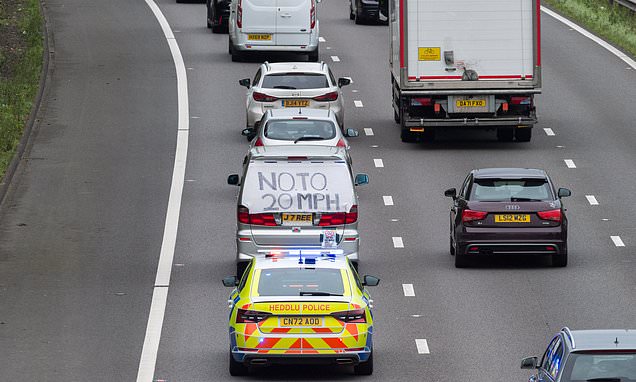Is Rishi backsliding on 20mph crackdown? Sunak says councils will still be able to impose Wales-style speed limits if they have ‘consent’ from local residents
Rishi Sunak raised fears he is already backsliding on his 20mph crackdown today as he opened Tory conference.
The PM admitted that councils will still be able to impose Wales-style limits as long as they have ‘consent’ from local residents.
Speaking on the BBC’s Sunday with Laura Kuenssberg, Mr Sunak said there would be ‘statutory guidance’ to achieve his promise of ‘slamming the brakes on the war on motorists’.
But he avoided giving details of the mechanism – suggesting Transport Secretary Mark Harper will flesh out the plans later.
Mr Sunak has put quelling ‘hare-brained schemes’ like blanket 20mph speed limits and low traffic neighbourhoods (LTNs) at the heart of his pitch to voters.
The shift in strategy, along with watering down Net Zero policies, comes after the backlash at ULEZ was credited for the Tories hanging on in the Uxbridge & South Ruislip by-election.
Rishi Sunak raised fears he is already backsliding on his 20mph crackdown today as he opened Tory conference
Protesters against 20mph speed limits marched through Cardiff city centre last week
Wales has become the first country in the UK to reduce speed limits down from 30mph in built-up residential areas
Pressed if he will stop local authorities introducing 20mph zones, Mr Sunak said: ‘What this is about is making sure that the statutory guidance that goes to local councils from Government is clear about making sure that councils – which are obviously in charge of what’s happening in their local areas – are doing things with the support and consent of their local communities, taking into account the needs of their communities, and not imposing things on them without their consent and say so.
‘What they (councils) should be allowed to do in all cases is act in accordance with the Government guidance.’
Mr Sunak told The Sun yesterday: ‘I’m slamming the brakes on the war on motorists – it is as simple as that.’
Mr Harper renewed his attack on 20mph speed limits yesterday as disgruntled drivers staged a go-slow motorway protest along the M4.
He said the Welsh government’s restrictions make ‘life harder for motorists’ and are ‘incredibly unpopular’ with the public.
Mr Harper said it was ‘not sensible to have a blanket policy’ like the decision in Wales.
The clampdown has seen Wales become the first country in the UK to reduce speed limits down from 30mph in built-up residential areas with a view to saving lives and cutting costs for the NHS.
Speaking to Times Radio earlier, Mr Harper said: ‘The research the Department for Transport did, a proper research study, showed that it doesn’t actually make much difference in actually reducing speed(s).
A vehicle is seen with a ‘No to 20mph’ sign across its back window and accompanied by police as drivers stage a go slow convoy protest driving at 30mph on the M4 from Magor Services near Newport to Swansea yesterday
‘Compliance isn’t good in areas where drivers can’t see the need for it, so we think local authorities should make these decisions where they think there are sensible reasons, for example, around schools -(it is) perfectly sensible to have a lower speed limit there – but we shouldn’t have blanket ones.
‘And that is why we’re looking at strengthening guidance to make it clear that a blanket 20mph speed limit doesn’t make sense.’
He said widespread 20mph zones ‘just makes life harder for motorists, harder for people to get around’.
Mr Harper continued: ‘Most people get to work in a car, take the kids to school in the car, and it doesn’t make a lot of sense.’
A Welsh Government spokesman said: ‘It is profoundly disappointing the prime minister is inadvertently or intentionally, choosing to mislead people about the introduction of 20mph.
‘It is not a blanket restriction. Speed limits on a great number of roads in Wales are unchanged and journey times take around a minute longer. This will save lives and make our communities safer.’
Source: Read Full Article




